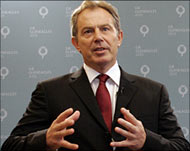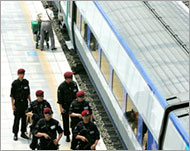Security tightened after London blasts
Police have promised a manhunt and heightened security, a day after morning rush-hour blasts shook the city’s underground metro and ripped apart a double-decker bus in the deadliest attacks on London since the second world war.

London public transport struggled to get running again on Friday after four bombs killed 37 people and wounded 700.
Transport for London (TfL) said that its buses would be running a “near normal” service and that much of the underground rail network, one of the world’s largest, would be running
Australian Prime Minister John Howard on Friday said he had information the death toll had climbed to 52, but London’s metropolitan police said 37 were killed and about 700 injured. Howard did not elaborate on where his information came from.
Bombings condemned
British Prime Minister Tony Blair, who had basked in the glory of London receiving the 2012 Summer Olympics, on Thursday condemned the attacks and blamed Islamic extremists. Foreign Minister Jack Straw said the attacks bore the hallmark of Osama bin Laden’s al-Qaida, the group responsible for the 11 September, 2001, attacks.
 |
|
British Prime Minister Tony Blair |
The “Secret Group of al-Qaida’s Jihad in Europe” claimed it was behind the attacks, but the claim could not be immediately verified. In a posting on a website, the group called them punishment for Britain’s involvement in the war in Iraq and invasion of Afghanistan. It said Italy and Denmark were on warning for their support of the US-led coalitions in both countries, too.
Timers
Based on evidence recovered from the rubble, investigators think some of the bombs were on timers, a US law enforcement official said. The official would not further describe the evidence.
Investigators said they doubt that cell phones, used in the Madrid train attacks last year, were used to detonate the bombs in the Underground because the phones often don’t work in the system’s tunnels, the official said.
The official spoke on condition of anonymity because the investigation is ongoing. Police and government spokespersons said they would not speculate on the devices.
A senior US counterterrorism official who spoke on condition of anonymity because of the sensitivity of the information said authorities were still investigating, but there was no confirmation “at all” that suicide bombers were involved.
Transit security
The blasts paralyzed the city’s public transportation system Thursday, halting subway service, delaying buses and stranding thousands of residents and tourists.
 |
|
Stranded passengers wait after |
There was a heavy police presence as subway lines reopened Friday. Some commuters, too skittish to venture back underground, took taxis to work, but others resumed their morning routines.
“I was scared, but what can you do?” said Raj Varatharaj, 32, as he emerged from a Tube station. “This is the fastest way for me to get to work. You just have to carry on.”
Streets empty after blasts
As the city coped with the attacks, and the uncertainty they bred, an eerie sense of calm swept over the teeming metropolis as night fell, with most streets deserted and many restaurants closed.
The city’s bustling West End, normally crowded with tourists catching the latest stage hits and dashing to restaurants, was mostly empty on Thursday. Most theatres canceled performances, the Society of London Theatre said.
The blasts went off within 18 minutes at the three stations, starting at 8.51am (07:51 GMT). Authorities initially blamed a power surge, but quickly realised it was a terror attack after the bus bombing at 9.47am, less than an hour after the first explosion.
G8 meeting
Fears of an attack had been heightened with leaders meeting in Scotland for the G8.
As Wednesday’s jubilation at winning the 2012 Olympics gave way to the shock of Thursday’s attacks, Blair rushed back to the capital and made a televised appeal for unity, praising the “stoicism and resiliency of the British people”.
 |
|
South Korean SWAT team members |
Both were in evidence across the city, as volunteers helped the walking wounded from blast sites, commuters loaned their phones so strangers could call home, and thousands faced long lines for homeward-bound buses or even longer walks without complaint.
“As Brits, we’ll carry on – it doesn’t scare us at all,” said tour guide Michael Cahill, 37. “Look, loads of people are walking down the streets. It’s Great Britain – not called ‘Great’ for nothing.”
Atop Buckingham Palace, the British flag flew at half-staff.
Heightened security
Security was raised in the United States and around the world.
The Bush administration upped the terror alert a notch to code orange for the nation’s mass transit systems, and bomb-sniffing dogs and armed police patrolled subways and buses in the capital.
Italy’s airports raised alert levels to a maximum.
Germany, the Czech Republic, Hungary, Russia, the Netherlands, France and Spain also announced increased security at shopping centers, airports, railways and subways.